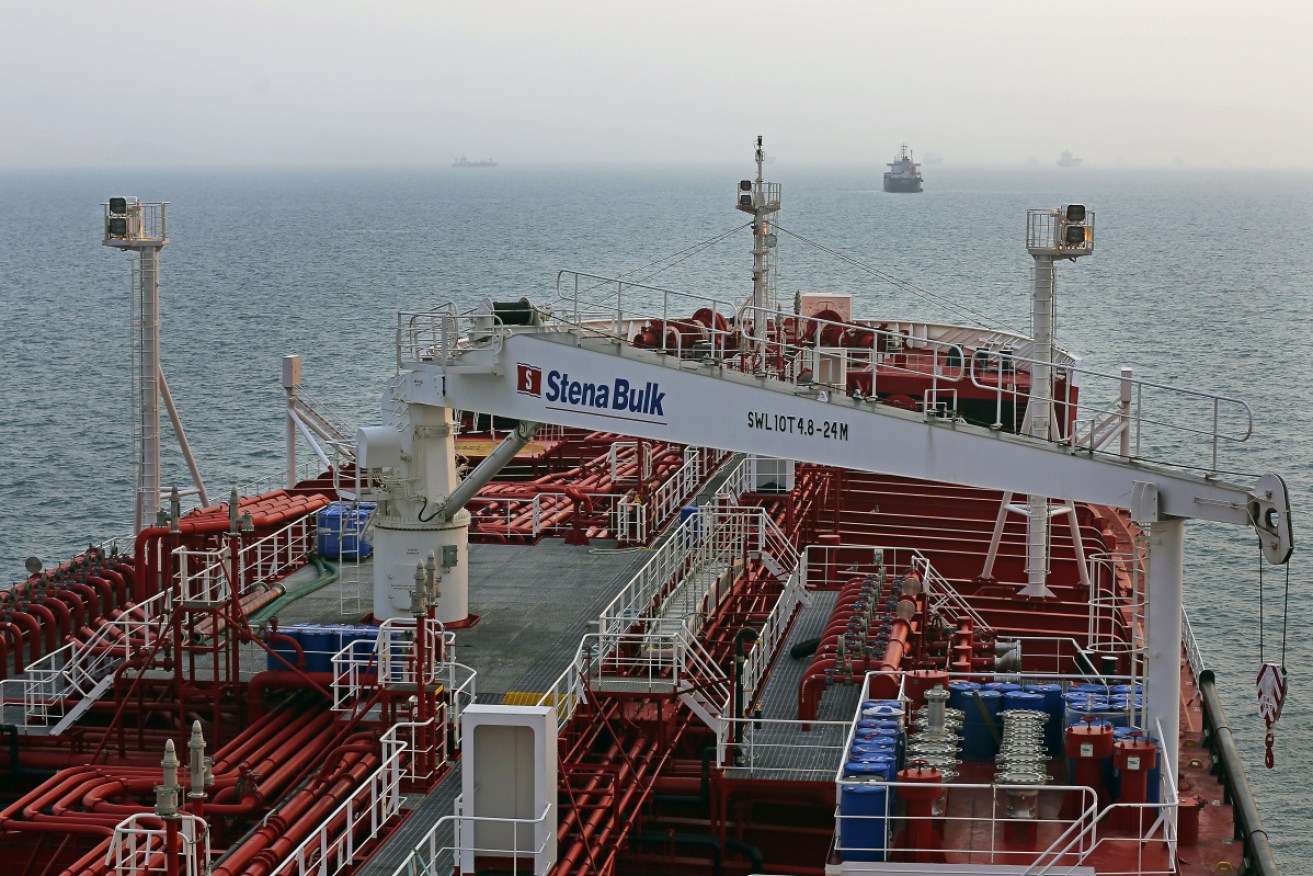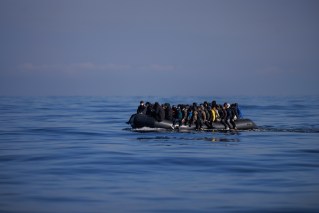British warship’s warnings to Iranian forces ignored


The Stena Impero anchored off the Iranian port city of Bandar Abbas. Photo: Getty
Britain is weighing its next moves in the Gulf tanker crisis, with few good options apparent as a recording emerged showing the Iranian military defied a British warship when it boarded and seized a ship three days ago.
Prime Minister Theresa May’s office says she will chair a meeting of Britain’s COBR emergency response committee in London on Monday to discuss the crisis.
Little clue has been given by Britain on how it plans to respond after Iranian Revolutionary Guards rappelled from helicopters and seized the Stena Impero in the Strait of Hormuz on Friday in apparent retaliation for the British capture of an Iranian tanker two weeks earlier.
Footage obtained by Reuters from an Iranian news agency on Sunday showed the tanker docked in an Iranian port with Iran’s flag hoisted atop.
Just hours earlier, maritime security risk firm Dryad Global released audio that revealed how the Royal Navy was unable to prevent the Stena Impero and its crew of 23 being seized.
The recording reveals that a British warship radioed an Iranian patrol boat to warn against interfering with the ship as it sailed through the Strait of Hormuz.
An Iranian officer can be heard telling tanker to change course to “360 degrees immediately”.
“You obey, you will be safe,” the officer said, who later told the crew the ship was wanted for security reasons.
#Exclusive VHF audio HMS Montrose & MV Stena Impero: 'If you obey you will be safe, alter your course . . .Under international law your passage must not be impaired, impeded, obstructed or hampered' #Iran #oil #tanker @tombateman @PatrickSawer @AP @AFP @Reuters pic.twitter.com/3fizOedeBe
— Dryad Global (@GlobalDryad) July 20, 2019
A British naval officer from the frigate HMS Montrose, which was patrolling the area, was then heard telling Stena Impero, which had a crew of 23 on board, that its passage must be allowed.
“Sir, I reiterate that as you are conducting transit passage in a recognised international strait, under international law your passage must not be impaired, intruded, obstructed or hampered,” the British officer said.
The officer then requested the Iranian patrol boat to: “Please confirm that you are not intending to violate international law by unlawfully attempting to board the MV Stena.”
In response, the Iranian boat said it was taking action for security purposes.
“This is Sepah Navy patrol boat. No challenge is intended, no challenge is intended. I want to inspect the ship for security reason.”
The Sepah navy is a special unit of the navy of the Islamic Revolutionary Guard Corps.
The British government is expected to announce its next steps in a speech to parliament on Monday but experts on the region say there are few obvious steps London can take at a time when the US has already imposed the maximum possible economic sanctions, banning all Iranian oil exports worldwide.
“We rant and rave and we shout at the ambassador and we hope it all goes away,” said Tim Ripley, a British defence expert who writes about the Gulf for Jane’s Defence Weekly.
“I don’t see at this point in time us being able to offer a concession that can resolve the crisis. Providing security and escort for future ships is a different matter.”
A day after calling the Iranian action a “hostile act”, top British officials kept comparatively quiet on Sunday, making clear that they had yet to settle on a response.
“We are going to be looking at a series of options,” junior defence minister Tobias Ellwood told Sky News.
“Our first and most important responsibility is to make sure we get a solution to the issue to do with the current ship, make sure other British-flagged ships are safe to operate in these waters and then look at the wider picture.”
Mr Ellwood also noted that the Royal Navy was “too small to manage our interests across the globe”, saying this would be an issue for Britain’s next prime minister to recognise.
“Firstly, we need to try and de-escalate this. There has been a ratcheting up of tensions in the Middle East,” he said.
The Iranian capture of the ship in the global oil trade’s most important waterway was the latest escalation in three months of spiralling confrontation with the West that began when new, tighter US sanctions took effect at the start of May.
Washington imposed the sanctions after President Donald Trump pulled out of a deal signed by his predecessor Barack Obama, which had provided Iran access to world trade in return for curbs on its nuclear program.
European countries, including Britain, have been caught in the middle. They disagreed with the US decision to quit the nuclear deal but have so far failed to offer Iran another way to receive the deal’s promised economic benefits.
Britain was thrust more directly into the confrontation on July 4, when its Royal Marines seized an Iranian tanker off the coast of Gibraltar, with Britain accusing it of violating sanctions on Syria.
While Iran’s official line is its capture of the Stena Impero was because of safety issues, it has done little to hide that the move was retaliatory.
Its tactics – with masked troops rappelling from helicopters – matched those the British had used two weeks before.
Iran’s Foreign Minister, Mohammad Javad Zarif, blamed Washington and Mr Trump’s hawkish national security adviser John Bolton for luring Britain into conflict.
Make no mistake:
Having failed to lure @realDonaldTrump into War of the Century, and fearing collapse of his #B_Team, @AmbJohnBolton is turning his venom against the UK in hopes of dragging it into a quagmire.
Only prudence and foresight can thwart such ploys.
— Javad Zarif (@JZarif) July 21, 2019
“Having failed to lure @realDonaldTrump into War of the Century … @AmbJohnBolton is turning his venom against the UK in hopes of dragging it into a quagmire,” Zarif wrote on Twitter.
“Only prudence and foresight can thwart such ploys.”
-with AAP








